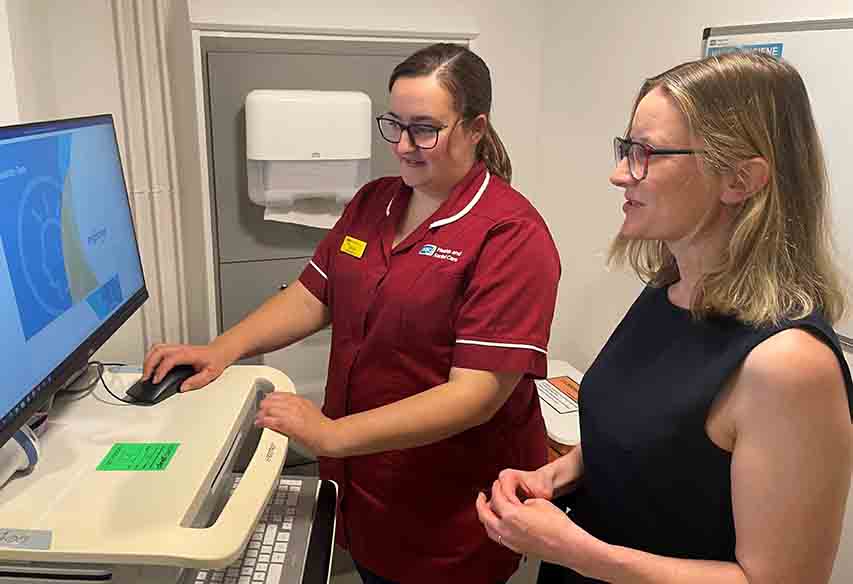A spotlight on migraine looking at struggles and solutions
Migraine affects thousands of people every day in Northern Ireland.
At the Ulster Hospital, Dr Louise Rusk, a GP with specialist interest in headaches, is raising awareness around the condition in an attempt to help those who suffer daily.
Migraine is a common yet often debilitating neurological disorder. It is more than ‘just a headache’.
Symptoms often include intense, throbbing pain in the head, along with nausea, vomiting and sensitivity to light, sound and even movement.
Attacks of migraine can last for hours or even days and can be so severe that they interfere with daily activities.
The person who has a migraine can find that attacks are triggered by a variety of factors, including stress, hormonal changes, certain foods and environmental factors like bright lights or strong smells, although it is not always possible to identify triggers.
Triggers may actually be warning signs that a headache is on its way – part of the prodrome. Recognising this early stage of migraine can be very helpful in managing the condition.
For those already suffering from migraine, treatment options are available to help alleviate symptoms. Dr Rusk emphasises the importance of seeking medical advice if quality of life is being affected. A good treatment plan might include both lifestyle adjustments and medication.
Dr Rusk explained that there are four stages of migraine, “Someone who is suffering from a migraine will typically feel unwell beforehand, what is called a ‘prodrome‘.

She said: “This happens before the onset of the headache. They may also have a craving for certain foods e.g sugary food, carbohydrates. In the next phase, called aura, about 1 in 3 people may have visual disturbances or tingling in the face or hand. And then there is the headache phase.
This is a moderate to severe headache with nausea and sensitivity to light and sound and they will feel unable to carry out day-to-day activities. Even after the headache subsides, most people will feel unwell for up to a day or two afterwards, known as a ‘postdrome’, and this can have a significant impact on daily life.”
What is important for those suffering from Migraine is to maintain a regular routine as possible, for example getting up at the same time each day, trying not to skip meals, stay well hydrated and do regular exercise.
There are two different categories of medication that can be used to treat Migraine such as acute or ‘rescue’ medication and ‘preventative’ medication.
Acute medication includes simple painkillers, triptans and even anti-sickness tablets. These can be taken when you start getting a headache. The earlier it is taken, the more effective it is.
While taking acute medication is very important in the treatment of migraines, ironically if it is taken too often, for example up to 10/15 days a month, this can actually worsen your headaches and even lead to daily headache.
A good rule of thumb is to avoid using rescue medications more than two days a week on average. f you need more than this, it is recommended to get some medical advice.
“One way of preventing this escalation in headaches is to seek early advice from your GP.
“For those who have more frequent headaches e.g more than four disabling headaches per month, a preventative everyday medication can be taken to help reduce the frequency and severity of the headaches.
“There are a range of medications available and it usually requires starting on a low dose and increasing over several months. Typically these medications will start to be effective once you have been on them for 8-12 weeks.
“Hormonal changes can also play a part in migraines. Those in peri-menopause can experience a significant worsening of a headache due to fluctuations with Oestrogen levels.
However, with the right support and treatment plan, patients can manage their symptoms effectively. The Women’s Health Concern has a dedicated page with information on migraine and HRT:
18-WHC-FACTSHEET-Migraine-and-HRT-NOV2023-B.pdf (womens-health-concern.org)
Dr Rusk added: “It is really important to educate yourself about migraines. The Migraine Trust is a research-driven charity that has lots of useful information, resources and support for people living with migraine.
“Other charities such as the National Migraine Centre and Migraine Ireland are also excellent resources for further support.
“For those struggling with migraines, patients should (initially contact their GP. It is useful to keep a record of headache frequency and medication use in preparation for this appointment.
“A one-page migraine diary can be downloaded from the Migraine Trust. GPs manage the vast majority of headaches, more than 90% of patients are seen and treated without the need for further referral.
“A small proportion of headaches that cannot be managed by the GP are then referred to the Neurology Team in the hospital.”
Further information and resources can be found by visiting:
www.nationalmigrainecentre.org.uk
Women’s Health Concern | Confidential Advice, Reassurance and Education (womens-health-concern.org)
· Dr Louise Rusk (GP with specialist interest in headaches)
· Dr Louise Rusk (GP with specialist interest in headaches) & Neurology Nurse, Nuala McKeown

























